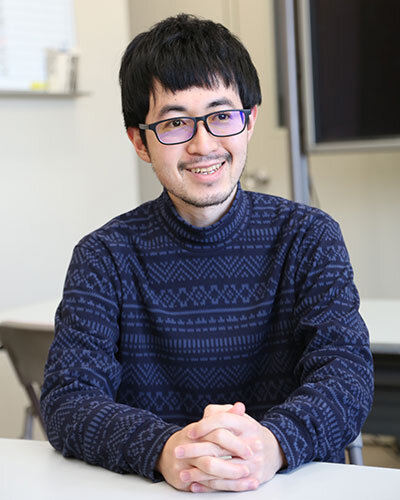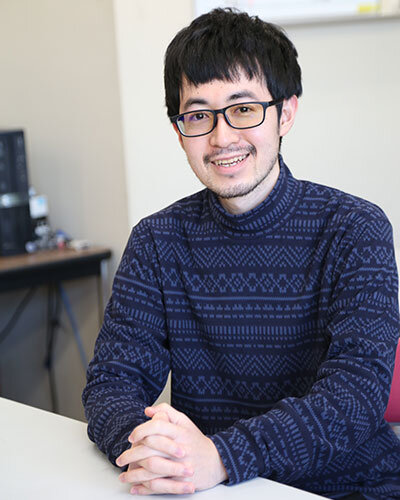INTRODUCTION学生紹介
- HOME
- support
- Student Introduction
- IWASE KAZUMA
STUDENT INTRODUCTION
Maritime Technology and Logistics
IWASE KAZUMA
Specializations:Logistics System Engineering
Main academic advisor:TAKENAWA, Tomoyuki
Mentor:TANOUE, Yuta / YOSHIOKA, Satoshi

Researching “pinpoint weather forecasts” more accurate than general forecasts; hoping for widespread use among the public
Boosting the accuracy of meteorological forecasts by forecasting for points rather than grids
My research is aimed at improving forecasts through the combination of meteorological phenomena and AI. Meteorological phenomena are predicted for 25×25 km and 20×20 km grids. However, the topography is not constant within each grid square, with high and low points and other variations. Grid-based forecasts do not take account of these variations, and for this reason, weather forecasts tend to be accurate for some areas but not for others.
I was considering ways of improving this situation when I conceived of predicting the weather for specific, pinpoint locations rather than grid squares.
My research uses data published by the Japan Meteorological Agency for locations around the globe, which I then convert and complement using AI.
My postgraduate research uses Japan Meteorological Agency data, which are produced using a well-known methodology
 I was engaged in the same research as an undergraduate, at which time I input the figures from forecast services into AI to produce predictions. The problem with the figures published by forecast services, however, was that we don't know how they are generated. For my postgraduate study and in the WISE Program, I am using data from the Japan Meteorological Agency that are generated using a published methodology.
I was engaged in the same research as an undergraduate, at which time I input the figures from forecast services into AI to produce predictions. The problem with the figures published by forecast services, however, was that we don't know how they are generated. For my postgraduate study and in the WISE Program, I am using data from the Japan Meteorological Agency that are generated using a published methodology.
I've been learning programming since my first year as an undergraduate and studied AI through classes and on my own. I learned through undergraduate AI classes how many problems can be solved using AI and became aware of just how useful it is. I wanted to learn more, which led to my current research and my own interests.
My research has produced good results compared with other weather forecasting services, and I think it will benefit society through more accurate predictions. I hope to see it adopted by news and online weather reports, and for the forecasts produced to be available to the general public.
Through an internship at the Japan Weather Association, I discovered how to "think from the perspective of the weather"
One of the benefits of my participation in the WISE Program has been a three-month internship, during which I worked at the Japan Weather Association.
I had the opportunity to talk with a member of the Japan Weather Association when I presented my research at the WISE Program student study meeting in 2022. At the time, I thought how good it would be if I could do an internship there, and my wish was granted.
During my internship, I researched how to improve the resolution of oceanic wind, participating in a project aimed at generating data for 5 km2 areas rather than the conventional 30 km2 grid squares.
I learned a lot as an intern. For example, I tended to be prejudiced toward AI knowledge and think from an AI-centric perspective, whereas weather specialists think from the perspective of weather phenomena. Faced with this difference, I felt that I also needed to incorporate a more weather-centric approach and sensed the need to study more about the weather. Following my internship, I began reading a lot of academic papers, all of which included knowledge of weather phenomena, and they have taught me a lot. I absorbed the kind of knowledge that is considered commonplace in the weather industry and deepened my understanding of the weather.
My practical duties as an intern also taught me where to find Japan Meteorological Agency data and how to use it. This has proven useful in my research.
Overseas study in Denmark, thanks to the opportunity to research the weather abroad
 Another benefit of my participation in the WISE Program has been overseas study. The WISE Program collaborates with a university in Denmark, and a professor at that university specializes in research on the weather and oceans. Since this fit perfectly with my own research, I applied to study in Denmark and will be there from January to March 2024.
Another benefit of my participation in the WISE Program has been overseas study. The WISE Program collaborates with a university in Denmark, and a professor at that university specializes in research on the weather and oceans. Since this fit perfectly with my own research, I applied to study in Denmark and will be there from January to March 2024.
At the university in Denmark, I hope to continue my current research while also utilizing data generated using European standards. I'm currently preparing by reading papers written by the Danish professor.
I've been working on my English language proficiency for some time because of my long-held desire to study abroad and my dream of using English to work overseas. In a decade's time, I hope to continue my research on overseas weather.
I concentrate best when I research in the morning and night, resting in the afternoon
Programming is the main component of my research. I live some distance from the university, and research at home on days when I don't need to attend the university for classes. I divide my time into two sessions, from 9 am to 1 pm and from 6 pm to 10 pm, with a long rest in between. I realize this is a somewhat unusual research schedule, but I find that it best allows me to concentrate. I often listen to audiobooks during my rest periods, and these days I'm into historical novels. After refreshing myself with an audiobook, I return to my research in the evening.

